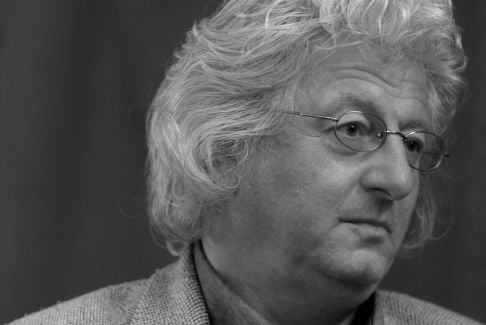
Péter Esterházy
- Hungary
- Zu Gast beim ilb: 2001, 2008
Péter Esterházy was born in Budapest in 1950. Although his grandfather owned land on a large-scale and was prime minister from 1917 to 1918, Esterházy grew up in poverty in a remote village, to which his family had been deported after the communist seizure of power. After going to a Piarist grammar school in Budapest he studied mathematics from 1969 to 1974 and went on to work as systems analyst for the Institute for Data Processing in the Ministry for the Steel and Engineering Industry. Esterházy established himself as a freelance writer in 1978 and two years later he went to West Berlin on a scholarship provided by the German Academic Exchange Service. Between 1996 and 1997 he spent another longish period of time in as a fellow of the Institute for Advanced Studies in Berlin. Esterházy received the Kossuth Prize, his country’s highest arts award, in 1996. His further awards include the Sándor Márai Prize (2001), the Hungarian Literature Prize (2001) and the Peace Prize of the German Book Trade (2004).
Esterházy has been heralded as an outstanding representative of Hungarian post-modernist literature. His approach to narrative was both on a collision course with the doctrine of Socialist Realism, and also with the traditional rules of epic poetry, which are based on the parameters of space, time, plot and character. »Words have no meaning, only uses.« Esterházy’s varied prose inventory consists of allusions, quotes (often unmarked), text repetition, dissolution and multiplication of narrative figures, manipulation of traditional structures, autobiographical and historical settings. Depictions of reality yield to endless linguistic variations and to texts »which write themselves«. Since the political changes in in the Soviet camp in 1989 and 1990, Esterházy has made greater use of journalistic styles, and addressed political and cultural issues in Central Europe.
The writer gained wide international reputation with his opus magnum »Harmonia Cælestis« (2001; Eng. »Celestial Harmonies«, 2004). The novel on the theme of Hungary and the Habsburg rule headed the list of Hungarian bestsellers for months. After he found out that his father, the central figure in his book, had been writing reports as an unofficial member of the the Hungarian secret police, Esterházy revised his story and published »Javított kiadás« (2003; t: Improved editon). Among his most recent publications in German translation are a collection of four plays, essays on football, and lectures on poetry »Über die Sprache des 21. Jahrhunderts« (2008; t: On language in the 21st Century). The author lives in Budapest.
The author died on July 14, 2016.
© international literature festival berlin
Das Buch Hrabals
Residenz
Salzburg [u.a.O.], 1991
[Ü: Zsuzsanna Gahse]
Harmonia Cælestis
Berlin Verlag
Berlin, 2001
[Ü. Terézia Mora]
Fancsiko und Pinta
Berlin Verlag
Berlin, 2002
[Ü: Zsuzsanna Gahse]
Verbesserte Ausgabe
Berlin Verlag
Berlin, 2003
[Ü: Hans Skirecki]
Deutschlandreise im Strafraum
Berlin Verlag
Berlin, 2006
[Ü: György Buda]
Einführung in die schöne Literatur
Berlin Verlag
Berlin, 2006
[Ü: Bernd-Rainer Barth]
Rubens und die nichteuklidischen Weiber
btb
Berlin, 2006
[Ü: György Buda, Zsuzanna Gahse]
Über die Sprache des 21. Jahrhunderts
[Hg. Dorothee Kimmich, Manfred Koch]
Swiridoff
Künzelsau, 2007
Übersetzung: Bernd-Rainer Barth, György Buda, Zsuzsanne Gahse, Terézia Mora und Hans Skirecki
